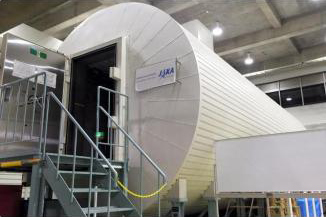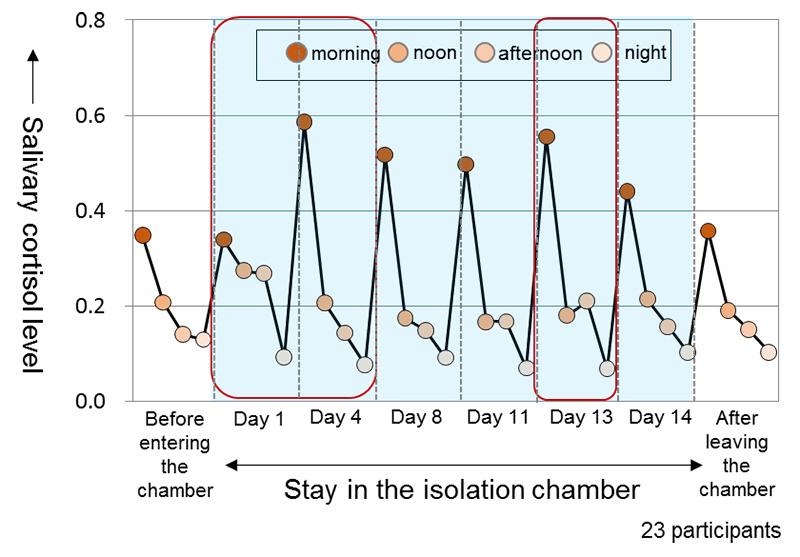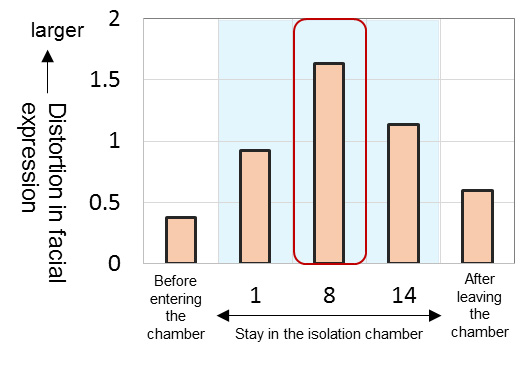Shiseido Conducts Joint Research on Stress in Closed-off Environment Simulating the International Space Station (ISS)
-Circadian rhythm of stress hormone disrupted, distortion in facial expression increased-
February 20, 2018 (JST)
Shiseido Company, Limited
National Research and Development Agency
Japan Aerospace Exploration Agency (JAXA)
Shiseido Company, Limited ("Shiseido") and National Research and Development Agency Japan Aerospace Exploration Agency (JAXA) have conducted a joint research using a closed-off chamber environment training facility ("the isolation chamber") in JAXA's Tsukuba Space Center and observed a disruption in the circadian rhythm of salivary stress hormone (cortisol) and an increased distortion in facial expression during the stay in the isolation chamber.
The team has discovered the possibility of quick stress self-assessment by studying changes in saliva and facial expression.
Based on the results of this ongoing joint research, Shiseido will pursue the development of comprehensive beauty solutions to minimize the effects of stress on skin and body, while JAXA will leverage the results to establish a stress assessment method for astronauts aboard the ISS.
Research overview and results
|
JAXA has been considering the introduction of biomarkers for stress self-assessment so that astronauts can easily check their stress level by themselves when they are unable to receive regular professional face-to-face assessments on their mental and psychological health. As part of these initiatives, JAXA runs tests in the isolation chamber that precisely controls the experiment conditions and tracks the participants’ behaviors in detail. (Picture 1) |

Picture 1: The Isolation Chamber |
|---|
- 1. The circadian rhythm of salivary cortisol was disrupted at the beginning of the stay and one day before the end of the stay in the isolation chamber.
- 2. The results of facial distortion test, which involved measuring the left‐right symmetry of facial expression, etc., showed an increase in the distortion level during the stay in the isolation chamber.
The results of this research suggest that the distortion in salivary cortisol level and facial expression may act as stress biomarkers and can be used not only in the space environment but also in a broader range of contexts. The results also revealed the possibility to easily apply facial distortion as a stress biomarker for various situations in daily life including daily stress assessment and remote assessment such as between space and the earth. These results were introduced at the 63rd Annual Meeting of Japan Society of Aerospace and Environmental Medicine.
On March 2, 2018, Shiseido's researcher Dr. Junichi Hosoi, who has long been involved in research on the relationship between stress and skin/immune system, will present the results of this research at I-ISEF (ISEF for Industries), a side event of the 2nd International Space Exploration Forum (ISEF).
Isolation test using the isolation chamber
In an isolation test, eight participants selected through open recruitment stay in the isolation chamber for two weeks with baseline data collected before entering and after exiting the chamber. As of February 20, 2018, five isolation tests have been completed, three of which Shiseido took part in.
Details of joint research results
1. Salivary cortisol
It is known that optimally performing cortisol follows a pattern called the “cortisol curve” and in a healthy curve, cortisol is high in the morning and tapers off through the day and evening. During this test, the salivary cortisol level was measured four times a day (in the morning, at noon, in the afternoon and at night). The results of the past three tests showed a distortion in the circadian rhythm of cortisol (increase in cortisol level at noon and in the afternoon) at the beginning of the stay and one day before the end of the stay in the isolation chamber, meaning that the stress level increased. The levels went back to normal after leaving the isolation chamber. (Chart 1)

(Based on the data before entering and after leaving the chamber, as well as Days 1, 4, 8, 11, 13 and 14 of the stay.)
Chart 1: Changes in circadian rhythm of stress hormone, cortisol
2. Facial distortion
Shiseido measured facial distortion level based on the symmetry in facial expression. The results showed that facial distortion was developed during the stay in isolation. (Chart 2)

Chart 2: Distortion in facial expression
Reference 1: Application of the facial distortion test results
- Shiseido will leverage the test results into further development of apps, such as adding a stress measuring function on “Smile App*”.
- *
- "Smile App," developed by Shiseido, takes a picture of the face with a tablet device camera and recognizes it, then quantifies it, evaluates its impression, and records the data. Through these processes, your smile, which is usually evaluated subjectively by the people looking at you, is analyzed objectively based on the impression it gives to other people.
Press Release URL:
http://www.shiseidogroup.com/news/detail.html?n=00000000002323
Reference 2: Joint researches of Shiseido and JAXA
- In 1998, Shiseido started an experiment on the anti-stress effect of aroma in space, extracting the scent of a rose that bloomed in space and reproducing it back on the earth in partnership with JAXA's predecessor, NASDA, the National Space Development Agency of Japan.
Press Release URL:
https://www.shiseidogroup.jp/newsimg/archive/00000000000123/123_f3q13_jp.pdf (Japanese Language only)
(Japanese Language only)
- In 2009, Shiseido provided makeup guidance during the No Gravity Dance performance in the ISS Japanese Experiment Module Kibo.
- In 2010 and 2011, Shiseido participated in the experiment on creation of nanoskeletons under microgravity conditions, focusing on the microgravity environment in the Experiment Module Kibo.